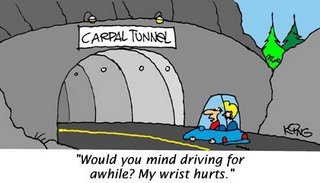Wellness for Writerly Wrists
 Yesterday, Kath blogged about the Little Writer in the Cramped Spare Room. Today, I'm going to tell you why you should be careful about those cramped spaces! A post for your health...
Yesterday, Kath blogged about the Little Writer in the Cramped Spare Room. Today, I'm going to tell you why you should be careful about those cramped spaces! A post for your health...You’re working feverishly on your latest novel when you notice it—a tingling pins-and-needles sensation in your fingers and hand. Those of us who spend a large part of our day typing away at a keyboard are at risk for a class of health problems called cumulative trauma disorders. One in particular stands out as being problematic for writers—carpal tunnel syndrome (CTS).
What it is.
Our wrists have a lot going on in them. There are tiny bones, tendons and nerves that all come together in one little area called the carpal tunnel to provide us with our wrist and hand functioning. When our daily activities put undue stress on this area—usually through repetitive motion, like typing on a keyboard—the grand-daddy wrist nerve, called the median nerve, gets squeezed and tendons surrounding the nerve swell. Problem is, because the area is so tiny, these tendons have nowhere to put their swollen selves but inward, pressing against the already harassed median nerve. Since this nerve is responsible for providing sensation to the hand as well as conducting signals from the brain, this squeezing can become problematic, leading to a tingling numbness in the fingers, hand and sometimes even up the arm. It usually affects your dominant hand first, though it may eventually affect the other hand as well.
 You might stop the tingling sensation by shaking your arm around a little, but this shouldn't become your quick-and-only fix. Catching CTS early is critical, because if left untreated the inflamed tendons can wear down the outside coating of the nerve, called the myelin sheath. This sheath is super important, acting like a grease covering your nerves. Because of this "grease," messages speed along from the brain to the hand, but without it, messaging slugs down. Worst of all, without the sheath's slippery protection, you can lose the ability to feel your hand and even grasp with it.
You might stop the tingling sensation by shaking your arm around a little, but this shouldn't become your quick-and-only fix. Catching CTS early is critical, because if left untreated the inflamed tendons can wear down the outside coating of the nerve, called the myelin sheath. This sheath is super important, acting like a grease covering your nerves. Because of this "grease," messages speed along from the brain to the hand, but without it, messaging slugs down. Worst of all, without the sheath's slippery protection, you can lose the ability to feel your hand and even grasp with it.Whose risk is greatest?
Sometimes it’s good to be one of a select few; being a finalist in a writing contest, for example, would be a wonderful thing. It’s not such a good thing to find you’re in a select group of people most prone to a disease, but some are more likely to develop CTS than others: those who are overweight, have diabetes or thyroid problems, for example. Women may be more prone to CTS, because the carpal tunnel is generally smaller in women than men. Women who are pregnant or on birth control may also be at increased risk, because the associated water-weight gain can add pressure to the nerve. Salt addicts may be susceptible as well, for the same reason.
What you can do.
See your doc at the first sign of trouble. Depending on your diagnosis, you may be steered toward one or more of these strategies:
• Take a break from the keyboard for a few minutes every half hour, and be sure the break is a TRUE break and doesn’t involve moving on to another repetitive action, such as gardening or painting.
• Fill some balloons with sand or buy a nerf ball, then squeeze them! This exercise and others—such as stretching and extension of the fingers—can help minimize the pressure in the carpal tunnel itself.

• Make sure your chair and keyboard are supporting hand health. Ideally, your forearms, hands and fingers should exist on the same plane, parallel to the ground. Armrests should be at a level that supports your stretching arms and allows your hands to lay on the keyboard without contortion or bouncing elbows. Wrists shouldn’t be pressed against the work area or keyboard (be sure to lift your hands while you type). Note: Products are available to aid workstation wellness, including ergonomic keyboards, ergo-bead wrist supports and more.
• Try a B6 supplement. After I was diagnosed with carpal tunnel, my doctor suggested I try this, and it really worked for me. I take a supplement that provides me with 100% of the recommended daily value for B6. (Be careful not to take megadoses of this vitamin, as it may lead to problems with the nervous system.)
Go on now--take a break to stretch your fingers. Then write on!

 posted by Therese Walsh at
posted by Therese Walsh at 


3 Comments:
OMG! As I was reading this and freaking abit, I grabbed a nerf ball buried in the back of my desk drawer. I'm going to keep it handy from now on.
This is great advice!
All writers should be aware of CTS.
Thx for the post.
CTS is pure evil. I know from personal experience. Anything you can do to avoid it, I highly recommend!!
Post a Comment
<< Home